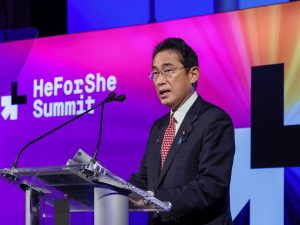Japanese Prime Minister Kishida Fumio’s departure to New York for this year’s U.N. General Assembly was delayed because of Typhoon 14, but once he arrived on Tuesday, September 20, he had a packed schedule.
On Tuesday, he met with British Prime Minister Liz Truss for the first time. During their meeting, they discussed their shared concerns about China’s potential use of force to change the status quo in the East and South China Seas, the situation in Ukraine, and the joint development of a next-generation fighter jet. Kishida also met with Turkish President Recep Tayyip Erdogan and discussed Ukraine and U.N. reform.
Kishida’s first day in New York concluded with a speech to the General Assembly in which he called for reforms of the U.N. Security Council and the abolition of nuclear weapons, criticized Russia’s invasion of Ukraine, and raised the issue of Japanese abductees in North Korea.
Japan has been aiming for U.N. reform for almost two decades now. However, in this year’s speech, Kishida tied Russia’s war in Ukraine directly to the need for reform: “We must face the fact that the credibility of the United Nations is at stake due to the aggression against Ukraine by Russia, a permanent member of the Security Council. We, the Member States of the UN, must act to restore this Organization’s credibility.” He continued, “Frequently, debates about the dysfunctionality of the Security Council have been pointed out. We have debated about this issue for almost over 30 years. But what is truly needed now is not a discussion for the sake of discussion, but actions toward reform… The time has come to start text-based negotiations to reform the Security Council.”
On Wednesday, Kishida met with Iranian President Ebrahim Raisi, and reiterated Japan’s support for the 2015 nuclear agreement. They also discussed improving relations, the situation in Yemen and other parts of the Middle East, and Russia’s war in Ukraine. Also on Wednesday, Kishida met with Philippine President Ferdinand Marcos Jr., and they agreed to cooperate in security, energy, and infrastructure, and discussed shared concerns about China’s growing maritime assertiveness in the East and South China Seas and China’s “economic coercion.”
During his meeting with U.S. President Joe Biden on Wednesday, Kishida lauded Biden for mentioning reform of the U.N. Security Council in his General Assembly speech. The two leaders agreed to work together on Security Council reform and to strengthen the Japan-U.S. alliance.
Throughout his time in New York, Kishida’s commitment to abolishing nuclear weapons has been consistent. He attended the first meeting of leaders of the Comprehensive Test Ban Treaty (CTBT) Friends: six like-minded nations that want to pass the CTBT as soon as possible – Japan, Australia, the Netherlands, Canada, Finland, and Germany. Although the Foreign Ministers of the CTBT Friends had met before, this was the first time that a meeting of the leaders of the six nations was held.
During his speech the night before, Kishida had used the platform to criticize Russia again, for “threatening the use of nuclear weapons,” and “[blocking] the unity and concerted efforts of the international community to reach consensus on an outcome document that would maintain and strengthen the NPT regime.”
The other persistent, tricky issue Kishida tried to deal with while in New York was Japan-South Korea relations. During a meeting on the sidelines of the CTBT meeting, Kishida and South Korean President Yoon Suk-yeol affirmed that Japan and South Korea are “important neighbors under the current strategic environment.” They agreed to improve trilateral cooperation with the United States, and deal with North Korea. Yoon also reiterated support for Japan’s efforts to resolve the abductees issue.
The Japanese government characterized the talks as “informal,” given that the issue of wartime forced labor is not resolved yet. Both Japan and South Korea are watching the outcome of the lawsuit against Japanese companies filed by wartime Korean laborers very closely.
The meeting, according to reporting by The Asahi Shimbun, was “awkward.” South Korea had unilaterally announced a meeting on the sidelines of the U.N. General Assembly before Kishida confirmed, which made Kishida disinclined to attend. However, Kishida attended the meeting after all, believing that the South Koreans were sincere in trying to mend relations. He did not have much to say at the meeting, and Yoon had to do most of the talking so a semblance of a meeting could be maintained.

































